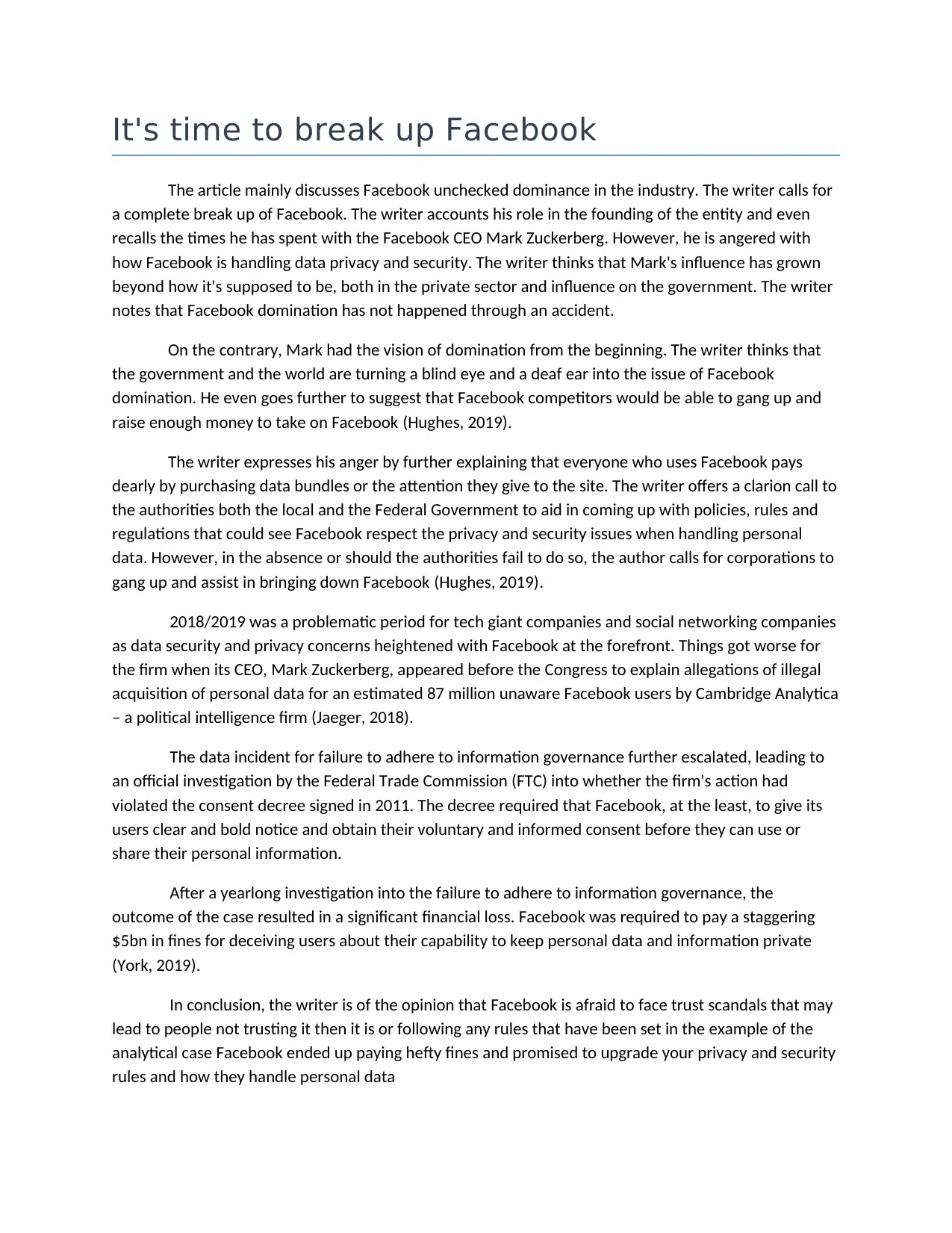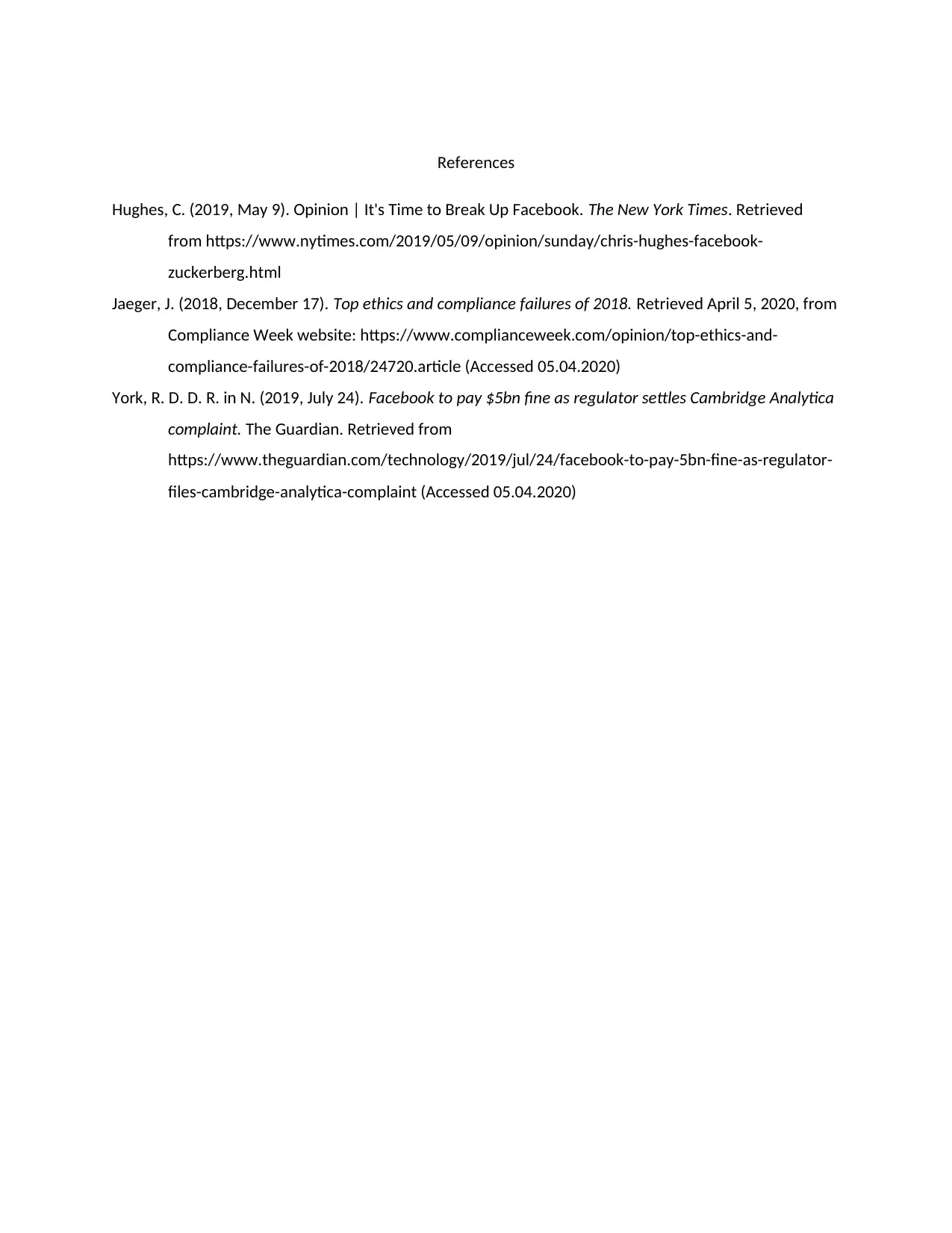It's time to break up Facebook | Assignment
VerifiedAdded on 2022/09/26
|2
|660
|21
Assignment
AI Summary
Contribute Materials
Your contribution can guide someone’s learning journey. Share your
documents today.

It's time to break up Facebook
The article mainly discusses Facebook unchecked dominance in the industry. The writer calls for
a complete break up of Facebook. The writer accounts his role in the founding of the entity and even
recalls the times he has spent with the Facebook CEO Mark Zuckerberg. However, he is angered with
how Facebook is handling data privacy and security. The writer thinks that Mark's influence has grown
beyond how it's supposed to be, both in the private sector and influence on the government. The writer
notes that Facebook domination has not happened through an accident.
On the contrary, Mark had the vision of domination from the beginning. The writer thinks that
the government and the world are turning a blind eye and a deaf ear into the issue of Facebook
domination. He even goes further to suggest that Facebook competitors would be able to gang up and
raise enough money to take on Facebook (Hughes, 2019).
The writer expresses his anger by further explaining that everyone who uses Facebook pays
dearly by purchasing data bundles or the attention they give to the site. The writer offers a clarion call to
the authorities both the local and the Federal Government to aid in coming up with policies, rules and
regulations that could see Facebook respect the privacy and security issues when handling personal
data. However, in the absence or should the authorities fail to do so, the author calls for corporations to
gang up and assist in bringing down Facebook (Hughes, 2019).
2018/2019 was a problematic period for tech giant companies and social networking companies
as data security and privacy concerns heightened with Facebook at the forefront. Things got worse for
the firm when its CEO, Mark Zuckerberg, appeared before the Congress to explain allegations of illegal
acquisition of personal data for an estimated 87 million unaware Facebook users by Cambridge Analytica
– a political intelligence firm (Jaeger, 2018).
The data incident for failure to adhere to information governance further escalated, leading to
an official investigation by the Federal Trade Commission (FTC) into whether the firm's action had
violated the consent decree signed in 2011. The decree required that Facebook, at the least, to give its
users clear and bold notice and obtain their voluntary and informed consent before they can use or
share their personal information.
After a yearlong investigation into the failure to adhere to information governance, the
outcome of the case resulted in a significant financial loss. Facebook was required to pay a staggering
$5bn in fines for deceiving users about their capability to keep personal data and information private
(York, 2019).
In conclusion, the writer is of the opinion that Facebook is afraid to face trust scandals that may
lead to people not trusting it then it is or following any rules that have been set in the example of the
analytical case Facebook ended up paying hefty fines and promised to upgrade your privacy and security
rules and how they handle personal data
The article mainly discusses Facebook unchecked dominance in the industry. The writer calls for
a complete break up of Facebook. The writer accounts his role in the founding of the entity and even
recalls the times he has spent with the Facebook CEO Mark Zuckerberg. However, he is angered with
how Facebook is handling data privacy and security. The writer thinks that Mark's influence has grown
beyond how it's supposed to be, both in the private sector and influence on the government. The writer
notes that Facebook domination has not happened through an accident.
On the contrary, Mark had the vision of domination from the beginning. The writer thinks that
the government and the world are turning a blind eye and a deaf ear into the issue of Facebook
domination. He even goes further to suggest that Facebook competitors would be able to gang up and
raise enough money to take on Facebook (Hughes, 2019).
The writer expresses his anger by further explaining that everyone who uses Facebook pays
dearly by purchasing data bundles or the attention they give to the site. The writer offers a clarion call to
the authorities both the local and the Federal Government to aid in coming up with policies, rules and
regulations that could see Facebook respect the privacy and security issues when handling personal
data. However, in the absence or should the authorities fail to do so, the author calls for corporations to
gang up and assist in bringing down Facebook (Hughes, 2019).
2018/2019 was a problematic period for tech giant companies and social networking companies
as data security and privacy concerns heightened with Facebook at the forefront. Things got worse for
the firm when its CEO, Mark Zuckerberg, appeared before the Congress to explain allegations of illegal
acquisition of personal data for an estimated 87 million unaware Facebook users by Cambridge Analytica
– a political intelligence firm (Jaeger, 2018).
The data incident for failure to adhere to information governance further escalated, leading to
an official investigation by the Federal Trade Commission (FTC) into whether the firm's action had
violated the consent decree signed in 2011. The decree required that Facebook, at the least, to give its
users clear and bold notice and obtain their voluntary and informed consent before they can use or
share their personal information.
After a yearlong investigation into the failure to adhere to information governance, the
outcome of the case resulted in a significant financial loss. Facebook was required to pay a staggering
$5bn in fines for deceiving users about their capability to keep personal data and information private
(York, 2019).
In conclusion, the writer is of the opinion that Facebook is afraid to face trust scandals that may
lead to people not trusting it then it is or following any rules that have been set in the example of the
analytical case Facebook ended up paying hefty fines and promised to upgrade your privacy and security
rules and how they handle personal data
Secure Best Marks with AI Grader
Need help grading? Try our AI Grader for instant feedback on your assignments.

References
Hughes, C. (2019, May 9). Opinion | It's Time to Break Up Facebook. The New York Times. Retrieved
from https://www.nytimes.com/2019/05/09/opinion/sunday/chris-hughes-facebook-
zuckerberg.html
Jaeger, J. (2018, December 17). Top ethics and compliance failures of 2018. Retrieved April 5, 2020, from
Compliance Week website: https://www.complianceweek.com/opinion/top-ethics-and-
compliance-failures-of-2018/24720.article (Accessed 05.04.2020)
York, R. D. D. R. in N. (2019, July 24). Facebook to pay $5bn fine as regulator settles Cambridge Analytica
complaint. The Guardian. Retrieved from
https://www.theguardian.com/technology/2019/jul/24/facebook-to-pay-5bn-fine-as-regulator-
files-cambridge-analytica-complaint (Accessed 05.04.2020)
Hughes, C. (2019, May 9). Opinion | It's Time to Break Up Facebook. The New York Times. Retrieved
from https://www.nytimes.com/2019/05/09/opinion/sunday/chris-hughes-facebook-
zuckerberg.html
Jaeger, J. (2018, December 17). Top ethics and compliance failures of 2018. Retrieved April 5, 2020, from
Compliance Week website: https://www.complianceweek.com/opinion/top-ethics-and-
compliance-failures-of-2018/24720.article (Accessed 05.04.2020)
York, R. D. D. R. in N. (2019, July 24). Facebook to pay $5bn fine as regulator settles Cambridge Analytica
complaint. The Guardian. Retrieved from
https://www.theguardian.com/technology/2019/jul/24/facebook-to-pay-5bn-fine-as-regulator-
files-cambridge-analytica-complaint (Accessed 05.04.2020)
1 out of 2
Related Documents
Your All-in-One AI-Powered Toolkit for Academic Success.
+13062052269
info@desklib.com
Available 24*7 on WhatsApp / Email
![[object Object]](/_next/static/media/star-bottom.7253800d.svg)
Unlock your academic potential
© 2024 | Zucol Services PVT LTD | All rights reserved.
